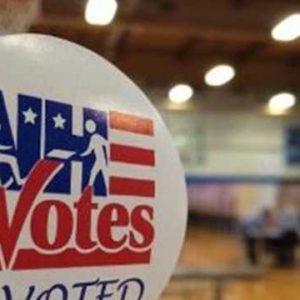When President Joe Biden and the Democratic National Committee plotted to kill the New Hampshire presidential primary, they were on to something. They just had the wrong date.
Ending New Hampshire’s First in the Nation primary was a terrible mistake. It’s an important, well-run contest that energizes voters and reveals the character of the candidates.
But today’s Sept. 10 state primary, on the other hand is a civic abomination that should be dragged behind the nearest middle school and clubbed into a coma.
Polls taken a month ago showed about six in 10 voters didn’t know enough about the GOP candidates for Congress to even have an opinion about them. About a third of Democrats were still undecided in the race for governor.
And thanks to tonight’s debate between Kamala Harris and Donald Trump, the primaries aren’t even the biggest political story in the state.
Folks, when your state’s primary gets big-footed by a debate between the two presidential candidates — you’re doing it wrong.
Who the hell holds their primary a week after Labor Day? Who gives the candidates just 56 days to prepare for the general election?
And there are 13 — count ’em, 13! — candidates in the Republican Second Congressional District primary. Who does this?
New Hampshire, that’s who.
By having America’s stupidest primary system, our political leaders have inflicted the worst possible campaign season on the voters. It’s both ludicrously long and ridiculously rushed at the same time. How is that even possible?
If it feels like the primary campaigns for governor and Congress have been going on forever, you’re right. New Hampshire Journal was reporting on Kelly Ayotte’s fundraising success back in June of 2023. Chuck Morse endorsed Donald Trump at a UNH rally last year.
And yet, if it feels like the candidates are cramming an entire campaign into a single calendar week, you’re also right. The mantra of Granite State political gurus is “The voters really start paying attention after Labor Day.”
Folks, Labor Day was seven days ago. That’s your campaign?
And so voters, who’ve barely heard of most of the candidates for Congress or Executive Council are being buried in a jumble of texts, mail, and TV ads in an insane political scramble.
Instead of sorting out the party nominees in the spring or early summer — 14 states, plus Washington, D.C., and Puerto Rico currently hold their primaries in June, more than any other month — New Hampshire forces candidates to fight for the voters’ attention during the heart of summer.
That’s a tough task in any year. It’s harder still during a presidential election year, when national candidates are commanding all the attention and the two parties are holding their conventions.
But when one of the parties forces an incumbent president off the ballot in July and introduces a brand new ticket in August? Fuggedaboutit.
Only New Hampshire, Rhode Island, and Delaware do what we’re doing today.
Dumb, Dumber, and Biden Country.
And then there are the ballots filled with the names of obscure candidates. In other states, getting on the ballot for an office as important as Congress requires meeting some threshold to prove at least a token level of seriousness. Some force would-be candidates to gather a significant number of signatures. Others require would-be candidates to stroke a meaningful check.
But New Hampshire makes it so easy to get on the ballot, most major elections include slates of “why the hell not?” candidates.
In the NH-01 GOP primary, there are seven people running, including perennial annoyance Andy Martin.
In the NH-02 race, there are 13 names on the GOP ballot, most of whom wouldn’t be recognized at a family reunion.
But they will all add their part to the confusion that comes with this compressed campaign cycle.
You can think Gov. Chris Sununu for vetoing a bill that would have moved New Hampshire’s primary to August — not ideal, but a step in the right direction.
Or you can blame Democrats in the legislature who opposed a bill that Sununu would have signed, moving the Granite State’s primary to June.
This is the year — the year when tonight’s local TV coverage of our election results is going to be preempted by a presidential debate — to finally fix this problem. This is the year, when the short general election calendar hurts Democrats for a change, that there might be bipartisan consensus to cut the political crap.
Then again, the reason for this idiotic calendar is that it protects incumbents from serious challengers, making it harder for them to unite their party and raise the money needed to mount a general election campaign.
So there’s no guarantee our public servants will serve the public by doing the right thing and moving the primary.
If we could put the date of this primary on the ballot, it would lose in a landslide.





